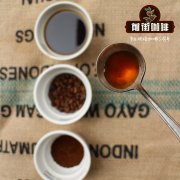Peru Organic Certified Coffee-Cajamarca Sol Y Cafe Sun and Coffee Cooperative Information

Professional coffee knowledge exchange more coffee bean information please follow the coffee workshop (Wechat official account cafe_style)
Peruvian Coffee-Sun and Coffee Cooperative.
Peru Cajamarca Sol Y Caf é
□ Peru has more than 11 million people engaged in agriculture-related work, the vast majority of whom are small farmers. Groups organized by small farmers play a particularly important role because of the long distance between cities and the high cost of transportation. In 2005, Fairtrade labelling International entered Peru to help Peruvian farmers enter the fair trade system and open up the international market. at present, more than 110 cooperatives have obtained fair trade labels.
Fair trade emphasizes that every link of the whole industrial chain, from consumers, traders, passers, producers, should be treated fairly, so if you want to obtain fair trade certification, you must comply with a certain degree of norms, such as giving farmers a reasonable income, friendly environment and so on.
In the past, the most direct way for farmers to increase their income was to continuously develop the rainforest and expand the planting area, making the original Amazon rainforest disappear 750000 square kilometers since the 1970s.
In recent years, the issue of environmental protection has been paid more and more attention, and how to make tropical rain forests and local farmers co-exist and co-flourish has also become an important topic in the world. So instead of cutting down the original forest, planting coffee trees in the shade has become one of the ways of sustainable utilization. In Peru, more than half of the coffee trees are planted in the shade. This can not only preserve the rainforest, but also improve the quality of coffee.
According to a report from the Public Television News topic Center, the road of Peruvian small farmers is getting wider and wider, making Peru the world's largest producer of organic coffee, with an export value of more than 200 million US dollars. The Peruvian government also deeply understands that organic agriculture is a road that is good for others and for themselves. in addition to encouraging small farmers to form associations or cooperatives, the Peruvian government also plans relevant supporting measures to make Peru the fifth largest exporter of organic agriculture.
Historical records...
Although coffee arrived in Peru relatively early in the mid-18th century, it was not until the 20th century that commercial exports began, European demand increased and Indonesian coffee production declined significantly. The British presence and influence in the country particularly helped to increase and promote exports: at the beginning of the 20th century, the British government acquired about 2 million hectares of land from the Peruvian government as payment of defaulted loans, most of which was converted into British coffee plantations.
As in many Central and South American countries, as large European land ownership was sold or redistributed throughout the 20th century, farms became smaller and more decentralized, providing independence for farmers, but also limited their access to resources and larger commercial markets. However, unlike many other countries where the coffee economy is dominated by smallholder farmers, Peru lacks organizations or infrastructure to provide economic or technical support to farmers-a loophole in addition to organization and certification. The country has a large number of certified organic coffee, as well as Fairtrade, Rainforest Alliance and UTZ certified coffee. About 30% of the country's small farmers are members of democratic cooperatives, which has raised the profile of coffee in the region, but has rarely brought incredibly high-quality products into the spotlight.
As of 2010, Peru was one of the top producers of Arabica coffee, ranking fifth in terms of world production and exports of Arabica coffee. The remoteness and small average size of coffee farms hinder the differentiation of large farms, which makes it possible for micro-area development and marketing in other growing areas, but like everything else in specialty coffee, this situation is changing rapidly. The country's lush highlands and good heirloom varieties provide growers with the potential to resist limited infrastructure and market access barriers, and as production increases, we are more likely to see these types of progress. Peru. Sun and Coffee Co-op. Organic coffee
Peru. Sun and Coffee Co-op. Organic certified coffee
Peru Cajamarca Sol Y Caf é
Peru position
□ producing area: Rioja/San Martin
□ producer: regional smallholder
□ altitude: 1200 Murray 2050
□ variety: Bourbon,Typica,Caturra,Catuai,Pache,Mondonovo
□ treatment: washing
□ flavor description: orange, lime, grapefruit and honey, green tea flavor, soft and smooth …
□ fair trade. Organic certification. Rainforest Alliance
Important Notice :
前街咖啡 FrontStreet Coffee has moved to new addredd:
FrontStreet Coffee Address: 315,Donghua East Road,GuangZhou
Tel:020 38364473
- Prev

Peru's first COE Competition-introduction to the Source of Information Story of Amazon boutique Coffee Cooperative
Professional coffee knowledge exchange more coffee bean information please follow the coffee workshop (Wechat official account cafe_style) Peruvian Coffee Excellence Cup Award-Amazon boutique coffee cooperative, the northern mountains of the Peruvian border, not only mysterious and year-round clouds, there are a lot of high-quality organic coffee. A major event in the coffee circle in 2017: Peru held the first Outstanding Cup Competition.
- Next

Introduction to the information story of Peruvian coffee producing area, the largest exporter of organic and fair trade coffee in the world.
Professional coffee knowledge exchange more coffee bean information Please pay attention to the coffee workshop (Wechat official account cafe_style) Peruvian coffee 70% of the coffee is produced in the north of the border, mainly Arabica, and most of it is organic coffee; coffee exports account for a high proportion of Peru's agricultural production. The coffee varieties grown in Peru are Bourbon, Typica and Ca.
Related
- Does Rose Summer choose Blue, Green or Red? Detailed explanation of Rose Summer Coffee plots and Classification in Panamanian Jade Manor
- What is the difference between the origin, producing area, processing plant, cooperative and manor of coffee beans?
- How fine does the espresso powder fit? how to grind the espresso?
- Sca coffee roasting degree color card coffee roasting degree 8 roasting color values what do you mean?
- The practice of lattes: how to make lattes at home
- Introduction to Indonesian Fine Coffee beans-- Java Coffee producing area of Indonesian Arabica Coffee
- How much will the flavor of light and medium roasted rose summer be expressed? What baking level is rose summer suitable for?
- Introduction to the characteristics of washing, sun-drying or wet-planing coffee commonly used in Mantenin, Indonesia
- Price characteristics of Arabica Coffee Bean Starbucks introduction to Manning Coffee Bean Taste producing area Variety Manor
- What is the authentic Yega flavor? What are the flavor characteristics of the really excellent Yejasuffi coffee beans?

